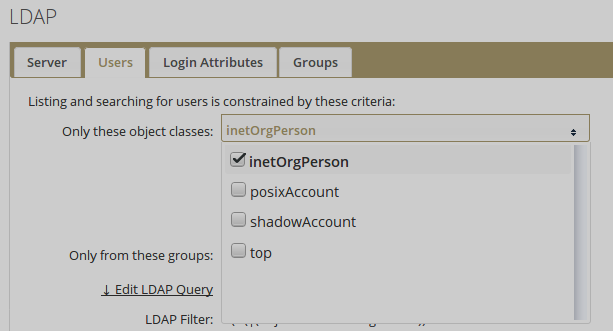Sorry to hear you’re facing problems 
If you’re urgently looking for support to keep your business running, consider checking out our paid support options.
In order to help you as quickly as possible, before clicking Create Topic please provide as much of the following as you can (you can cut and paste this into your topic):
Nextcloud version (eg, 10.0.2): 11.02
Operating system and version (eg, Ubuntu 16.04): 14.04
Apache or nginx version (eg, Apache 2.4.25): 2.4.7-1ubuntu4.13
PHP version (eg, 5.6):PHP 7.0.16-3+deb.sury.org~trusty+1
Is this the first time you’ve seen this error?: no
Can you reliably replicate it? (If so, please outline steps): Configure LDAP auth
The issue you are facing: posix groups are found and selected under teh “Users” tab, however nextcloud reports “0 users found” when clicking Verify. The query building wrongly assumes this is a groupOfNames object when posixGroups have actually been selected.
(&(|(objectclass=inetOrgPerson))(|(memberof=cn=nextcloud,ou=groups,dc=myorg,dc=com)))
The output of your Nextcloud log in Admin > Logging:
{“reqId”:“qjJA8tYcYG9x3njrBr61”,“remoteAddr”:“10.14.13.1”,“app”:“user_ldap”,“message”:“Configuration Error (prefix ): login filter does not contain %uid place holder.”,“level”:2,“time”:“2017-03-01T22:16:37+00:00”,“method”:“GET”,“url”:"/ocs/v2.php/apps/notifications/api/v2/notifications",“user”:“admin”,“version”:“11.0.2.7”}
The output of your config.php file in /path/to/nextcloud (make sure you remove any identifiable information!):
<?php
$CONFIG = array (
'instanceid' => 'xxxxxxxxxxxxxxxx',
'passwordsalt' => 'xxxxxxxxxxxxxxxx',
'secret' => 'xxxxxxxxxxxxxxxxxxxxxxxxxxxx',
'trusted_domains' =>
array (
0 => 'wal.myorg.com',
1 => 'do.myorg.com',
2 => 'ig.myorg.com',
),
'datadirectory' => '/var/www/nextcloud_data',
'overwrite.cli.url' => 'http://localhost:8777',
'dbtype' => 'mysql',
'version' => '11.0.2.7',
'dbname' => 'mydb',
'dbhost' => 'localhost',
'dbport' => '',
'dbtableprefix' => 'oc_',
'dbuser' => 'xxxxxxxxxxxx',
'dbpassword' => 'xxxxxxxxxxxxx',
'logtimezone' => 'UTC',
'installed' => true,
'memcache.distributed' => '\\OC\\Memcache\\Redis',
'memcache.locking' => '\\OC\\Memcache\\Redis',
'memcache.local' => '\\OC\\Memcache\\APCu',
'redis' =>
array (
'host' => '127.0.0.1',
'port' => 6379,
),
'ldapIgnoreNamingRules' => false,
'ldapProviderFactory' => '\\OCA\\User_LDAP\\LDAPProviderFactory',
);
The output of your Apache/nginx/system log in `/var/log/____`:
10.14.13.1 - - [01/Mar/2017:16:20:41 -0600] "POST /index.php/apps/user_ldap/ajax/wizard.php HTTP/1.1" 200 995 "-" "Mozilla/5.0 (X11; Linux x86_64; rv:51.0) Gecko/20100101 Firefox/51.0"
10.14.13.1 - - [01/Mar/2017:16:20:41 -0600] "POST /index.php/apps/user_ldap/ajax/wizard.php HTTP/1.1" 200 1166 "-" "Mozilla/5.0 (X11; Linux x86_64; rv:51.0) Gecko/20100101 Firefox/51.0"
---
Remember, this information may be requested if it isn't supplied; for fastest response please provide as much as you can :heart: Feel free to use a pastebin service, otherwise log files can be indented with 4 spaces on each line to present them in a friendlier way on the forum.


